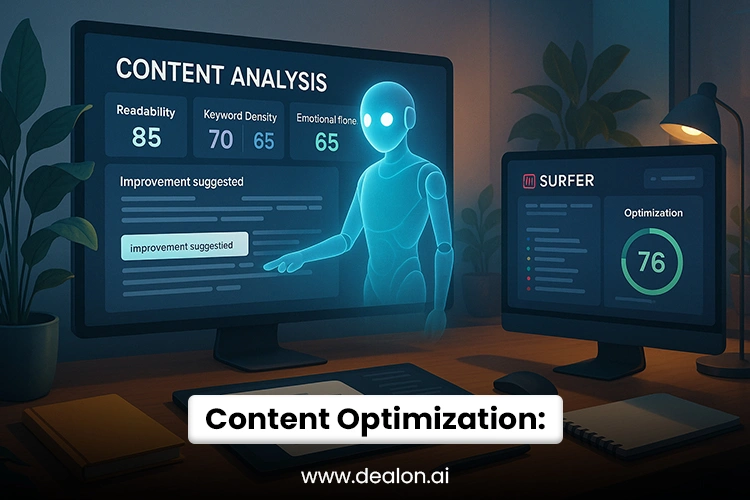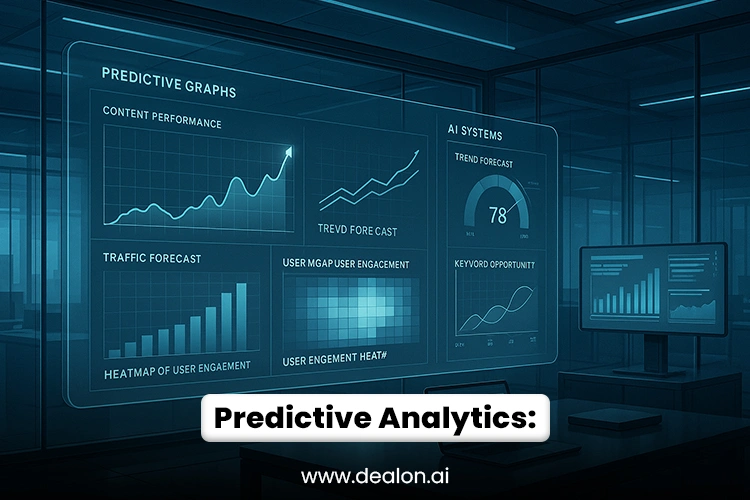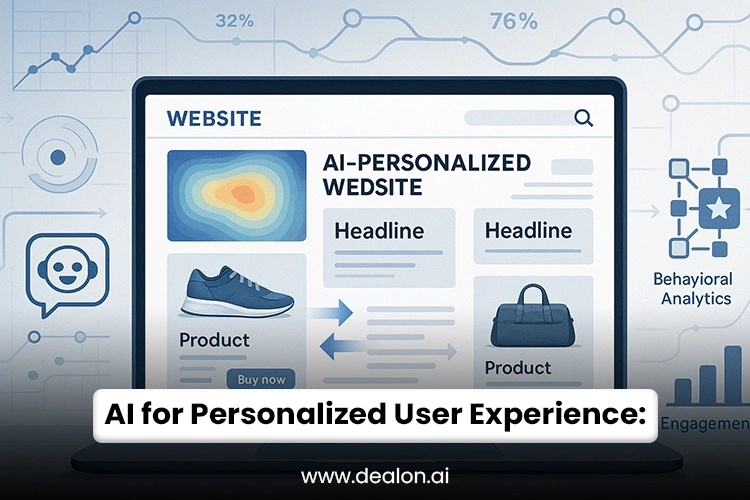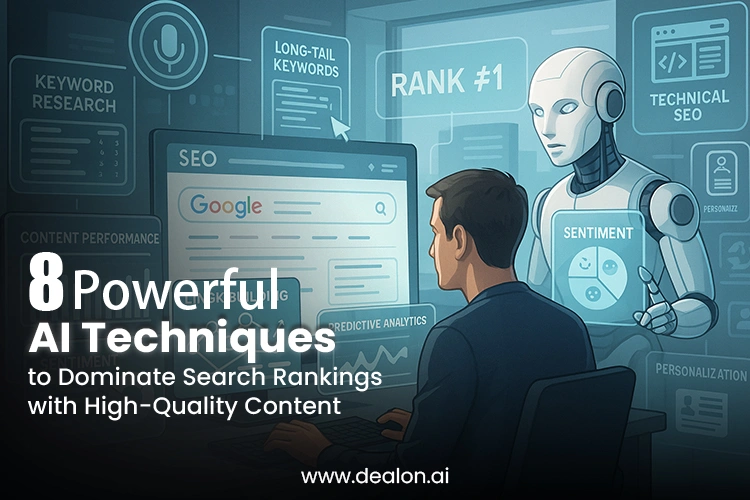Getting the finest positions on search engines has surpassed being a target to become a serious competition. It takes more than the usual SEO efforts to remain ahead since algorithms change in an unprecedented way. The game changer is Artificial Intelligence (AI) that has disrupted how businesses deal with SEO and web visibility. Due to its robust features, ranging from deep learning models to advanced natural language processing (NLP), AI is no longer an option for optimizing websites, improving their UX, and creating organic traffic. Businesses can expand their existing SEO efforts, accordingly foresee algorithm shifts, and stay flexible in constant change.
AI provides many innovative tools that automate and thus improve processes, making SEO more effective and accurate. Whether creating high-quality content, technical SEO, or identifying user intent, AI offers unprecedented chances to boost search ranking. Read on to find out eight bold techniques of AI that can revolutionize your SEO strategy. These methods are formulated to give businesses the competitive advantage they need to outshine their competitors, become search engine rulers, and build consistent traffic, as the world turns algorithmic.
Also Read: AI and Disaster Response: Using Data to Predict and Manage Natural Catastrophes
AI-Driven Keyword Research and Analysis: A Revolutionary Approach
Keyword research is an evergreen pillar of SEO, but in this rush hour of digital space, traditional methods don’t cut ice. Businesses need to take the advanced AI technologies further than essential keyword generation. AI-powered keyword research tools utilize MLs to mine through monumental quantities of data in search of insights that are not only search volume-driven but also supported by user intent, trends, and behavior. Such sophistication allows businesses to hone in on a more refined understanding of the catchwords that affect their relevant clients the most.
AI-driven keyword research has one of its biggest strengths in predicting emerging trends. Relying on outdated historical search data is a usual disadvantage of conventional keyword research since new subjects or changes in the online users’ behavior emerge. However, AI leverages real-time data processing to identify patterns and forecast the keywords that will increase in popularity. This predictability power is a priceless resource; businesses can create content around keywords poised to thrive, therefore having the upper hand on the SERPs over the competition that will inevitably catch up.
In addition, other AI tools such as Google’s’ RankBrain, as well as SEMrush and Ahrefs platforms, also turn to NLP methods to determine the context of use of keywords. This guarantees that content is optimized for relevance to keywords and the semantic meaning to increase the chance of appearing in search queries by users. Through understanding user intent (whether informational, transactional, or navigational), AI empowers businesses to supply users with their desired answers, thus increasing their chances of ranking.
Content Optimization with AI-Powered Insights: Elevating Quality and Relevance

Content is the king in the world of SEO, and content optimization for search engines and actual readers, in this case, is an issue that needs delicate handling. AI-driven insights are revolutionizing how it’s made to conform to SEO requirements and appeal to the intended audience. AI tools with advanced algorithms, especially Natural Language Processing (NLP), can deeply dig into your content to point out areas of improvement regarding structure, tone, readability, and relevance. This degree of detail enables marketers to increase the quality of their content to a point where it becomes likely to be ranked higher in search engine results.
Such AI tools as Clearscope and SurferSEO are essential for content optimization. These platforms investigate how your present content is doing and offer suggestions on making it effective. AI will help make your copy conform to contemporary best practices in SEO by checking keyword density, sentence structure, and length. Furthermore, AI can suggest changes to headings, meta descriptions, and subheadings to make it less challenging to read and clearer. Such elements assist marketers in tuning their content with the search engine algorithms without the risk of losing the audience’s focus.
The most interesting AI content optimization capability is sentiment and emotional tone. Analyses Examining the general tone of your content, AI tools can indicate whether any changes should be made to match your audience’s preferences, whether they are leading towards an authoritative style or a more friendly conversational tone. This means that it ranks and genuinely engages with users, improving engagement metrics such as time on page and bounce rates (two primary factors affecting search rankings). After all, AI-based content optimization enables marketers to create superior, relevant content that boosts the search rating and adds real value to the audience.
Predictive Analytics for Content Performance: Data-Driven SEO Strategies

Ahead-staying is not just a reactive tactic; it demands foresight. With AI, predictive analytics can tell what specific pieces of content will perform like even before they are published. Through analyzing history data for finding patterns, AI tools can predict which subjects, keywords, or formats are likely to be eye-catching, drive traffic, and improve search rankings. By this approach, businesses can remove trial-and-error tactics and reach informed verdicts based on statistics.
This forecasting power eradicates the guesswork for content creation, leaving marketers with a definite map of creating content that will hit right with users and be ranked higher. Finally, using predictive analytics under your SEO strategy will drive more intelligent decisions, making content more quantity and quality oriented and toward continued growth in search rankings.
AI for Personalized User Experience: Enhancing Engagement and Boosting Rankings

Today’s environment has seen more focus from Google and other search engines on the aspect of creating good user experiences (UX). We sites should offer high-quality content and offer easy, personal service that will keep users engaged. Ac uiring this, AI takes a leading role by personalizing the useuser’surney and making sure every interaction matters, is relevant, and timely to the indindividual’snts.
AI-enabled tools—chatbots, dynamic content delivery systems, personalized recommendation engines help adjust the content of websites based on user behavior in real-time. For example, AI chatbots can reply to some questions or help immediately; dynamic content engines can change the homepage or product recommendations based on the visvisitor’sst interactions and interests. This personalization increases engagement and consequently, more extended dwell time and higher probability of revisit, two critical signals used by search engines to measure site quality.
The more personalized a user experience, the greater the chances that search engines will bless your site with better rankings. By leveraging AI, businesses build an intelligent, responsive context that responds to each visitor personally, thus building deeper relationships with their audience and improving their SEO performance by leaps and bounds, laying the foundations for their long-term organic expansion.
AI-Enhanced Link Building: Making a backlink acquisition process efficient for SEO success.
Backlinks are one of the most influential ranking elements in SEO, and high-quality links from powerful sites indicate trust and credibility to search engines. Traditional link-building techniques are, however, cumbersome and ineffective. At this point, AI intervenes by presenting creative solutions to simplify and enhance the link-building process.
AI tools can parse through high-authority sites to find pages that will link to your content. When analyzed through AI-powered systems such as Ahrefs and Moz, large data sets allow machine learning techniques to evaluate your competitors’ profiles. Which gaps are still to be filled, and which opportunities are left unexploited by the competitors? This data-oriented strategy allows businesses to focus on the best and most authoritative sites for potential backlinks and significantly increases the chances of receiving desirable links.
Moreover, AI-enabled outreach tools automate the laborious task of contacting the owners or editors of the sites, so that marketers can make a backlink request with a personal message. Such tools can detect patterns in engagement, alter the outreach approaches, and provide the maximum response rates. Li k building becomes more strategic and data-supported than ever with AI, making your SEO efforts more productive, time-saving, and cost-saving. Finally, using AI for link-building puts businesses in a position to earn effective backlinks that deliver increased search positions and solidify online authority.
Voice Search Optimization Using AI: Evolution to The Future of Search
With the voice search technology changing how users interact with search engines, the adaptation of switching to voice queries is now essential in retaining competitive search rankings. AI-powered approaches in specific, specifically natural language processing (NLP) and speech recognition, help businesses adjust their SEO strategy to get the maximum out of voice search traffic.
Voice search questions are conversational and queries-oriented compared to traditional text-based searches. Such a change in user behavior requires a focus on long-tail keywords, question phrases, and the natural language of a human. AI-based tools can examine voice query patterns, determine the nature of questions their users tend to ask, and offer optimization of the content that will correspond to those typical conversation styles.
Google BERT algorithm that makes use of deep learning to interpret the meaning of search queries through language has greatly modified how search engines view voice-based inputs. Vo ce search optimization (with the help of AI) is a key strategy for future-proofing your SEO, & guarantee your content will be seen in an increasingly voice-driven search universe.
AI-Powered Technical SEO Audits and content strategy through Sentiment analysis
Technical matters can go unnoticed in the field of SEO, yet are very influential to the search rankings. The AI-powered technical SEO audits prove to be a practical solution to the detection, as well as elimination, of such hidden barriers. These audits exceed fundamental analysis by using state-of-the-art algorithms to scour your website for numerous technical issues that may hinder search engine reach.
AI tools detect broken links, slow loading speed, duplicate content, bad mobile responsiveness, and site code structural problems – all directly affecting user experience and SEO performance. AI-powered audits are distinguished from the rest by their accuracy and breadth. While a traditional audit leaves some points unchecked, AI can access extensive data, identify the slightest technological difference in details that may influence a site’s performance.
Such audits are performed by platforms such as DeepCrawl and SEMrush, which use AI to make the task easier and save precious time. With careful insights, businesses can resolve issues with the site promptly, optimizing website operation and adherence to search engine rules. AI-facilitated audits make the process smoother and contribute to preserving a competitive advantage in SEO, which makes websites continue being optimized for search engines and users.
Knowing your emotional response is as important as optimizing for keywords in SEO nowadays. AI-based sentiment analysis tools provide a sneak peek into what users feel about your content and build a more effective strategy for the content that connects with your target audience. Analyzing the emotional meaning of reviews, comments, and mentions on social media, AI can detect whether the sentiment toward your brand is positive, negative, or neutral.
This sensitive appreciation of user sentiment lets businesses hone their content to optimize engagement. Good sentiment means your content is well-received, so you can scale and create more shareable pieces. On the other hand, the adverse sentiment is the critical feedback telling what areas of your content may be missed, or what satisfies the needs of expectations are not met. Fixing these problems will contribute a great deal to enhancing user satisfaction and search ranking.
With sentiment analysis as a part of your content strategy, you can make your material attune to what your audience feels and likes. This AI-based approach increases engagement and can help maintain the relevancy and appeal of your content that goes a long way for increasing search rankings and protecting brand loyalty.
Conclusion
The application of AI for SEO strategy is now not an alternative; there needs to be competitiveness in the ever changing digital space. No method discussed- ranging from AI-based keyword search to sentiment analysis is not important in optimizing your website in terms of getting the better ranking slot in the search findings. When using MLAs, natural language processing, and predictive analytics, businesses can improve all areas of their SEO, from content development and technical audit to link building and user experience optimization.
AI capacity wherebyit is able to process huge amounts of data tackling patterns that escape human detection allows marketers to make informed decisions, improving quality and efficiency of their SEO effo ts. Methods such as voice search optimization and creating customized user experiences keep the businesses at the lead on the changing face of search engines by focusing on the user intent and engagement.
Companies can improve their search rankings and attain a more sustainable internet presence using these AI-powered tools and strategies. With search engine algorithms becoming smarter, using AI in your SEO toolkit will become the mark of distinction between dominating search rankings, traffic, and remaining relevant in a more competitive digital ecosystem, and becoming archaic.

